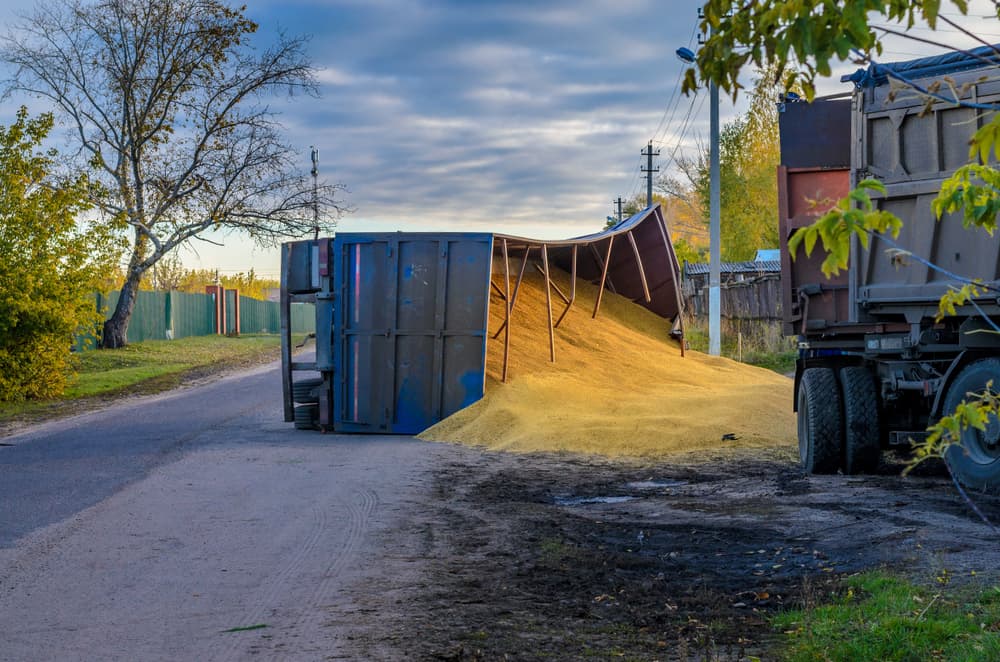Truck accidents often cause disastrous consequences, including debilitating injuries and irreversible loss of life. When a truck crash occurs, it can leave injured victims and families of those killed wondering what they can do to move forward. The first thing to do is determine what caused the accident and who can be responsible for your losses.
However, many different factors can contribute to truck accidents, and different parties can be to blame. So, where do you begin when trying to pinpoint the cause of your truck crash?
Fortunately, you do not have to worry about this on your own. While you undergo medical treatment for your injuries, a truck accident attorney can investigate and determine the cause of your crash.
Never wait to consult and hire your truck accident attorney in San Jose following a crash so they can begin protecting your rights.
Causes of Truck Accidents
Below are several key factors known to contribute to truck accidents:
Driver Fatigue

Exhaustion can severely impair a truck driver’s ability to concentrate and react to road conditions. Long hours on the road without frequent and sufficient rest breaks can lead to a state of fatigue, which researchers say can be as dangerous as driving under the influence of alcohol or drugs.
- Who is liable? If driver fatigue plays a role in an accident, the driver may be held liable. Additionally, if the trucking company failed to enforce proper rest periods, they could face responsibility for the incident caused by fatigued or drowsy driving.
Time Pressure
The trucking industry often operates on tight schedules, pressuring drivers to meet demanding – and oftentimes unrealistic – delivery deadlines. This time crunch can create an environment where speed and hours of service regulations might be ignored to fulfill job requirements, increasing the risk of accidents.
- Who is liable? When accidents occur under time pressure, liability may fall on the employers for setting unreasonable schedules or on the drivers if they choose to bypass safety regulations to meet deadlines.
Speeding

To adhere to strict timelines, truck drivers may exceed speed limits or drive at speeds unsuitable for road conditions. Speeding reduces the time available to respond to potential hazards and increases the severity of an accident should one occur. Speeding causes almost one-third of all traffic fatalities, which include deaths from truck accidents.
- Who is liable? In cases involving speeding, the truck driver would typically be held liable for any accidents that result. However, if a trucking company encouraged speeding to meet deadlines, they could also be responsible.
Improperly Loaded Cargo

The way a truck’s cargo is loaded impacts its handling and stability when maneuvering. Improper loading can cause cargo shifts that may lead to rollovers or loss of control. Overloading or uneven distribution of weight are typical culprits in such scenarios.
- Who is liable? Liability for a truck accident caused by improperly loaded cargo may be attributed to the cargo loading company and/or the driver if they are required to check for securement before departure.
Distracted Driving

Distractions, like texting, using navigation systems, or eating while driving, can cause the driver to take their eyes off the road. Even a momentary distraction can be detrimental at trucks’ high speeds and long stopping distances.
Statistically speaking, inattentive and distracted driving are known contributing factors recorded in more than 5 percent of all truck accidents involving fatalities.
- Who is liable? Truck drivers are generally held liable when distracted driving causes an accident. Employers might also face liability if they fail to provide proper training or enforce rules regarding distractions.
Poor Driver Training
Operating a commercial truck requires specialized skills. Insufficient training on vehicle operation, safety practices, and defensive driving techniques can leave drivers unprepared for on-the-road challenges.
- Who is liable? The liability for accidents due to poor driver training often lies with the trucking company for not ensuring their drivers were sufficiently skilled and informed before allowing them on the road.
Equipment Failure
Malfunctioning components, such as brakes or tires, contribute to accidents. Regular maintenance is essential to prevent such failures, but inadequate inspections or disregarded maintenance schedules can lead to catastrophic failures.
A large causation study by the Federal Motor Carrier Safety Administration (FMCSA) showed that equipment failure contributed to nearly 40 percent of truck accidents.
- Who is liable? In the case of equipment failure, liability may fall on maintenance teams, manufacturers, or operators, depending on whether the cause was inadequate maintenance, defective parts, or operator error.
Impairment From Drugs or Alcohol
Substance use is a significant hazard in any driving scenario. For truck drivers, the use of drugs or alcohol while operating a vehicle is not only illegal but also puts their lives and the lives of others at risk due to impaired judgment and slower reaction times.
- Who is liable? Drivers operating under the influence will face direct liability, and employers could be partially responsible if they did not adequately screen employees or ignored previous incidents of impairment.
Failing to Adjust Driving to Road and Weather Conditions

Truck drivers must adapt their style to accommodate various road surfaces, visibility, and weather conditions.
Failure to do so can result in losing vehicle control, especially in adverse weather conditions such as rain, snow, ice, or fog.
- Who is liable? The driver is typically liable for not effectively adjusting to the road and weather conditions. However, if the employer has not provided appropriate training for driving in various conditions, they may also be partially responsible.
How Can You Determine What Caused a Truck Accident?
Uncovering the cause is critical for legal and insurance purposes, especially when seeking compensation for damages or injuries sustained.
Taking the following steps can help you determine the cause of your truck accident:
- Obtain a police report. Obtaining the police report is always a fundamental step. The responding officers will usually document their initial findings, witness statements, and their opinions on how the accident may have occurred. Often, police reports contain valuable insights that can set the groundwork for further investigation and be used to determine what caused a truck accident.
- Have your lawyer investigate the accident scene. A lawyer with experience in trucking accidents will know what to look for at the accident scene, from skid marks and debris distribution to malfunctioning traffic signals – all of which can provide clues about the accident’s cause.
- Send a spoliation letter. Sending a spoliation letter is a legal action that requires the preservation of all evidence related to the accident. It includes the truck, the cargo, the driver’s logs, and any electronic data available from onboard systems (also known as the “black box” data). This action helps prevent critical evidence from being repaired, erased, destroyed, or tampered with.
- Review the truck driver’s logs and personnel file. A thorough examination of the driver’s logs can reveal if they were following the mandated hours of service (HOS) regulations designed to prevent accidents due to fatigue. HOS rules require a minimum 30-minute break after eight cumulative hours of driving. The truck driver’s personnel file might shed light on their training, experience, and history within the industry, which can all be factors in the accident.
- Check trucking company records. Investigating the trucking company’s records can uncover whether they have a history of safety violations, accidents, or negligence in maintaining their fleet. In some cases, the pressure from the company to meet delivery deadlines can indirectly contribute to truck drivers’ risky driving behaviors and fatigue, leading to accidents.
- Hire accident reconstruction experts. Accident reconstruction experts are trained to analyze the evidence and simulate the accident scenario to determine the likely cause or causes. Their experience provides scientific explanations that support legal discussions, reinforcing the conclusions drawn from the investigation.
You might want to get the assistance of a lawyer to ensure that you know how to correctly determine the cause of your truck accident and that all liable parties are held accountable.
Common Challenges in Determining the Cause of a Truck Accident

Establishing the cause of your truck accident is critical for securing compensation, but it is far from straightforward.
Here are key challenges victims and their lawyers often face when understanding what went wrong.
- Limited or conflicting evidence. Accident scenes are chaotic, and valuable evidence can be missed or misinterpreted by those involved in the crash. In the case of truck accidents, the scale of the crash can lead to scattered or obliterated evidence, making it challenging to construct an accurate picture of events. Witnesses might provide conflicting accounts, which can further complicate matters.
- The trucking company’s ability to destroy or tamper with evidence. All too often, trucking companies possess the resources to interfere with an accident investigation. Some may even destroy or alter evidence to protect their interests. It is not always done with malicious intent. Sometimes, it is a matter of routine vehicle maintenance, such as overwriting electronic logging devices, which can erase valuable data.
- The potential for multiple liable parties. Determining liability in a truck accident is not always as simple as pinpointing one responsible party. There can be multiple liable parties, including the truck driver, the trucking company, manufacturers of truck parts, or other negligent drivers, to name a few. Sorting through these possibilities requires thorough investigation and can become exceedingly complex.
- Disputes over liability or damages. Gather the evidence demonstrating the cause of the truck accident. Each party can disagree about liability or to what extent each party is responsible.
- Resistance from insurance companies or other parties. Insurance companies are known for resisting paying out claims, particularly those of substantial value. They may deploy various tactics to minimize payouts, including contesting the severity of injuries or arguing that the victim caused the truck accident.
Having a lawyer can help you overcome these and many other challenges when handling your legal case after the truck accident. Your lawyer will investigate the accident, identify all liable parties, assess the monetary value of your case, and pursue the compensation to which you are entitled.
Why Truck Accidents Are More Dangerous Than Car Accidents
Despite the fact that collisions between regular cars are more common than those involving trucks, truck accidents tend to be more dangerous because of:
- Size and weight differences. One of the most glaring contrasts between a truck and a regular car is their size and weight. Trucks are enormous, weighing 20 to 30 times more than passenger cars. This immense weight means that when a truck is involved in an accident, the force of impact is substantially greater, leading to more severe damage and a higher likelihood of fatality or serious injury.
- Longer stopping distance. The stopping distance for trucks is significantly longer than that for cars because of their hefty mass. Even when traveling at the same speed, a truck needs more time and distance to come to a complete stop. This inability to halt swiftly can turn seemingly mundane situations into catastrophic ones if a truck driver fails to anticipate the need to stop in time.
- Blind spots. The large size of trucks creates extensive blind spots or “no-zones” around the vehicle, especially on the sides and rear. Drivers of passenger vehicles may unknowingly linger in these blind spots, increasing the risk of being sideswiped or cut off if the truck changes direction without noticing the smaller vehicle’s presence.
- Driver fatigue. Truck drivers often face grueling schedules and may spend long hours on the road to meet strict deadlines. Each year, truckers drive from 80,000 to 110,000 miles. By contrast, regular drivers only drive between 12,000 and 14,000 miles annually. Despite regulations intended to ensure rest and recovery, fatigue remains a persistent issue among truckers. A tired truck driver’s reaction time and decision-making abilities are impaired, increasing the risk of an accident.
- Cargo shifts. Trucks carry substantial loads weighing tens of thousands of pounds. If not properly secured, cargo can shift during transportation. Sudden shifts in cargo can cause a truck to lose balance and tip over or jackknife, especially in sharp turns or abrupt stops, presenting a deadly danger to nearby vehicles.
These factors make truck accidents more likely to occur and – when they do – deadlier than collisions between regular cars. This makes seeking justice after a truck crash more important than ever.

Seek the legal representation you need from a personal injury lawyer immediately.


